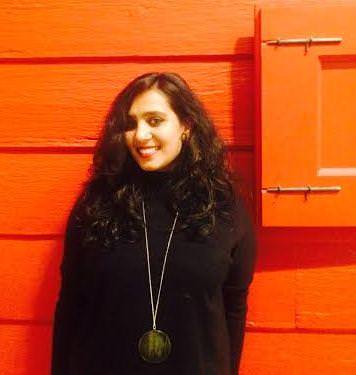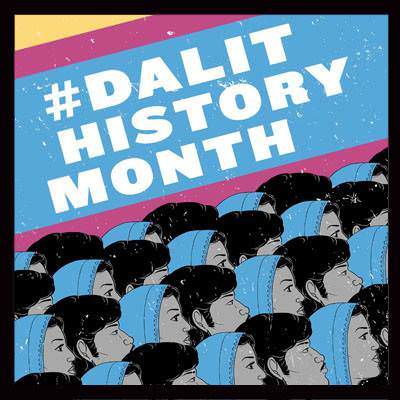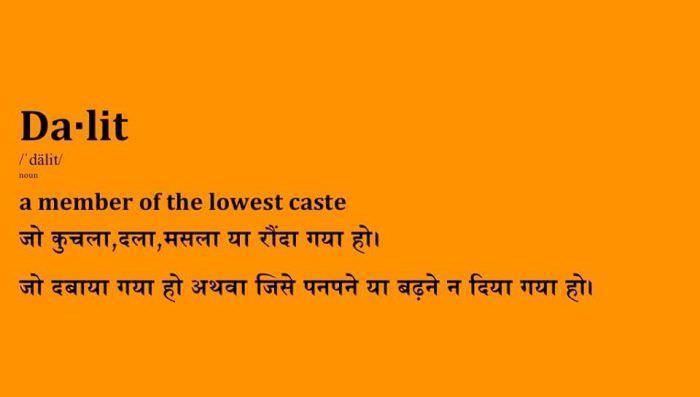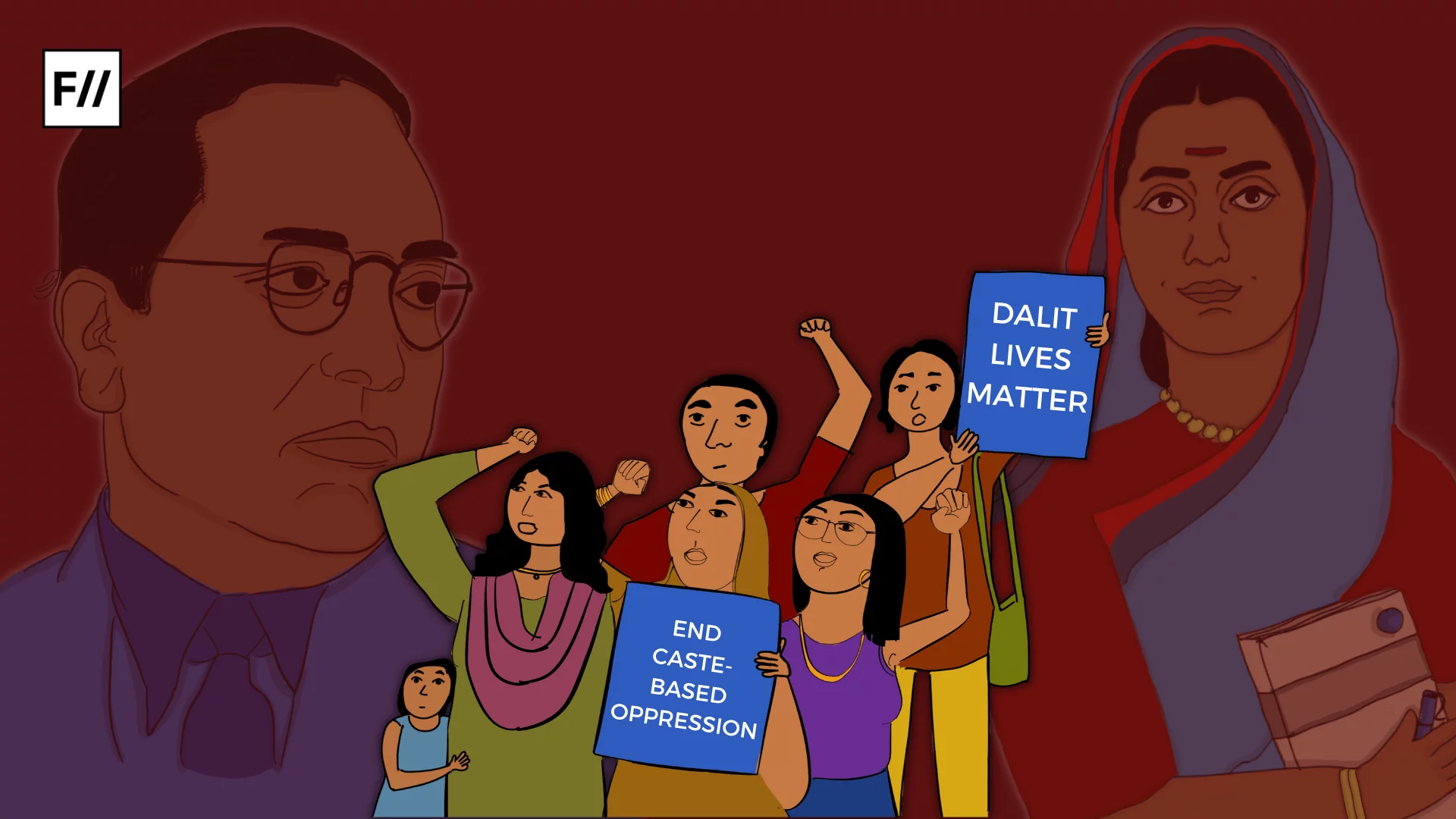Yashica Dutt grew up in India and hid her Dalit identity for the majority of her life here. She was afraid of what would happen if people would know that her family belonged to the lowest caste. She experienced discrimination because of her caste identity for the first time at the age of 15 when her friend stopped speaking to her after she and her parents learned that Yashica was Dalit. She says she was never hurt again that way because she became ‘really good’ at hiding who she was. Generations back, her family changed their surname from Nidaniya, a name that revealed their traditional profession as scavengers, to Dutt, a more ambiguous surname.

Ever since Yashica Dutt came out as Dalit after the institutionalized murder of Dalit PhD scholar Rohith Vemula, her inbox has been flooded with messages from many other Dalit women who don’t wish to remain silent anymore. However, as happens with every other story about a woman speaking her mind, a trail of abuses, trolls and hate comments followed her story. She was asked to sit down and shut up, stop ‘victimising’ herself and disappear. She was accused of borrowing her coming out from Western LGBT and #BlackLivesMatter movements – as if that’s a bad thing to do – and the usual clichéd arguments of reservation and quota, while conveniently ignoring their own upper-caste privilege. But the outpouring of support kept her going.
I caught Yashica candid on how it feels to be a Dalit woman posting her opinion online and being attacked almost every single day.
Japleen: Would you say that Rohith Vemula inspired you to come out as Dalit?
Yashica: Yes, entirely. It was only after I read his last letter that I realized my position of privilege and how easily I could have been in his place, had I not had the ‘luck’ to hide my Dalit identity.
J: In your blog post titled ‘Today, I’m coming out as Dalit‘, you remember how you used to hide your caste and pass off as ‘non-Dalit’. Can you give us examples of the same from your childhood or before you came out as Dalit?
Y: I routinely lied about my caste when I was questioned about it. Apart from telling people I was Brahmin, my go to excuse was that I was Marwari. I thought I was so slick in successfully fooling people by saying that and assuming that they wouldn’t find out that Marwari was, in fact, a distinction of the region instead of caste.
I was born in a Dalit family in Ajmer, Rajasthan. And I grew up learning to hide it. My convent school education, a non-Dalit sounding last name, and a skin color that was ‘dusky but still not dirty’ eased my passing as a non-Dalit. “Beta, what caste are you from?” “Aunty, Brahmin.” A lie I spoke so often and with such conviction, that I not only fooled my friends’ mothers but even myself. But I couldn’t fool the shame that spread my face each time someone mentioned ‘caste’, ‘reservation’, ‘bhangi’ – the common slur, which loosely translates to a human scavenger and the name of my exact caste.
J: Can you elaborate on how the oppressed succumb to internalized discrimination and self-censorship?
A: I can’t speak for everybody but based on my life experience and the letters I have received, I can safely say that a lot of us tend to internalize being non-Dalit as inherently superior as being Dalit. For e.g. I was deeply ashamed to even utter the word Bhangi (my real caste) in public. My ears would turn red and my tongue would freeze when a classmate used that as a swear word to humiliate someone. I would also go mute when someone would bring up the topic of reservation, fearing that people would assume lower caste if I spoke in favor of it. Even till few years ago, I lived in real fear of my closest friends breaking ties with me on finding out my caste. Thankfully for me, that never happened.
J: What were some of the arguments used to silence you after you came out as Dalit?
A: As I have written about it before, there were many arguments that people used to silence me. I was told I was doing this for publicity or for money. I was questioned why I only spoke about Dalit issues and nothing else. I was asked why I remained silent till now, even when I had explicitly explained myself over and over. Someone said I was actually Christian and spreading ‘Western agenda’, while others accused me of being divisive by even mentioning caste. Some even questioned my credentials and questioned my right to speak about what was essentially my life experience.
There were many who wanted me to sit down, shut up and disappear. They tried to blame me, break me and brutally silence my spirit. But the outpouring of support kept me going.
J: There are many other women who came out as Dalit after you. Do you wish it wasn’t somehow such a brave thing to do?
A: Absolutely. In fact, I was shocked when my own inboxes were flooded with messages applauding my coming out as brave. All I had done was expressed my real caste identity, which people like Rohith Vemula live with all their lives and even get persecuted for. It surprised me that I was being lauded for being myself. And made me realize how powerful mine and several other women who ‘came out’ identities were.
J: You have been accused of making being Dalit as cool. But, why shouldn’t that be?
A: It should be cool. Because like I have said, ‘cool’ is an aspirational value. It’s something people wish to be. But given the grave discrimination that happens against Dalits, unfortunately our identity isn’t what anyone probably aspires to. No one willingly wants to be Dalit, even those with half-baked knowledge of caste, who think they should be Dalit and avail the reservation. All they want is the so-called benefit (which in fact is our constitutional right) without any idea of the discrimination and real threats we face on a daily basis. It’s not cool because being Dalit means being at the lowest possible place of the social ladder. And no one wants that.
J: The discourse around Dalits so far has revolved around caste discrimination, reservation and brutal incidents. Do you think initiatives like #DalitHistoryMonth are changing the way we look at the Dalit discourse?
Y: I sincerely hope that it does. Our history is one that of pride and overcoming intense struggle and adversity. Any single Dalit person who manages to graduate and secure a job in the society is a source of #Dalitpride and should be celebrated. Only because education for us is not the easy and obvious choice it is for other castes. Not only do we often not have the resources to aspire for education, we are bitterly discriminated against in schools and universities when we manage to. Dalit History Month sheds light on people who not only overcame that, but also managed to be a source of hope and inspiration for the entire community.

J: Can you throw some light on how non-Dalit people can discuss and debate sensitively on Dalit issues and caste discrimination?
A: The first and foremost step a non-Dalit person can do is to listen. Instead of feeling victimized and blamed, non-Dalit people can start by keeping an open mind to experiences vastly different from theirs. Don’t be quick to jump to judgment or defend yourself. Listen to what someone else, who has had a history of oppression across millennia, has to say.
Listen to Dalits and their stories of discrimination before you say how “casteism in a thing of the past”…
J: Why did you start the Tumblr blog Documents of Dalit Discrimination? What do you aim to achieve and how do you see it growing?
A: When I started the Tumblr I was only driven by one idea: No one knows what we grow through. There is no place where people like me and I, could talk about our experiences without being judged, attacked and shut down by ‘upper caste’ voices. So all I wanted was to create a platform where our voices and experiences could have a safe space without any judgment, a space where we controlled the narrative and had the freedom to present it as is, without external bias. That’s why I started the Tumblr.
J: In one of your interviews you give out a powerful statement, “It’s wrong to be quiet,”. What would be your message to non-Dalit allies?
A: If you truly want to be an ally, have empathy. Don’t tell us what we should or shouldn’t do. For once, just listen to us and offer your support. Understand your own position in the caste system and think about ways you can help us equalize the society. And most importantly, never assume you know what it’s like to be Dalit.
All images courtesy Yashica Dutt (Twitter @YashicaDutt).
About the author(s)
Japleen smashes the patriarchy for a living! She is the founder-CEO of Feminism in India, an award-winning digital, bilingual, intersectional feminist media platform. She is also an Acumen Fellow, a TEDx speaker and a UN World Summit Young Innovator. Japleen likes to garden, travel, swim and cycle.




